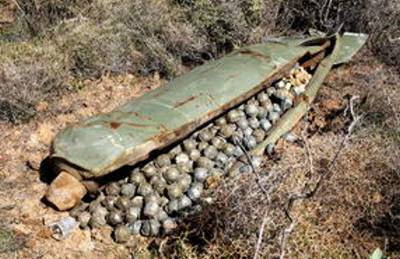Canada Hedges its Bets on Cluster Bombs
The World Federalist Movement has issued a press release about Canada’s new federal legislation ratifying the implementation of the Convention on Cluster Munitions — an international treaty intended to ban the use of cluster bombs.
Canada signed the treaty in 2008, but has only now ratified it by passing the implementing legislation. There is widespread criticism of the Canadian legislation because it still allows Canadian forces to take part in “combined operations” with an ally — that would be the United States, which has “opted out” of the treaty — using cluster bombs. And of course, that is the very ground upon which the Canadian government defends its loophole: the need to remain “interoperable” with the United States.
What’s wrong with cluster bombs? That is, more wrong than other forms of explosives used in wars? One cluster bomb consists of hundreds of smaller bombs, many of which fail to explode on delivery, and can lie scattered and undetected in the landscape for years, until they are discovered — and unwittingly exploded — by civilians as they go about their daily lives. Often the casualties are children.
The World Federalist Movement’s statement notes that “Numerous legal experts, as well as all of Canada’s opposition parties, called for the legislation to be radically revised, to eliminate the “exceptions” (Article 11) that allow Canadian soldiers to participate in actions otherwise proscribed by the treaty. Notably, the government of Norway and the International Committee of the Red Cross called for changes to the bill. In Canada, the World Federalists presented an “open letter” signed by 27 international law experts that indicated in detail why the Canadian legislation is inconsistent with the treaty’s fundamental purpose – a ban on cluster munitions.
“Canada’s damaging legislation sets a bad precedent. It creates incentives for others to write their own exceptions and loopholes. A couple of million dollars in program funding for mine clearance activities does not undo the significant damage that Canada’s bad example sets for this important piece of international humanitarian law.”



























Comments